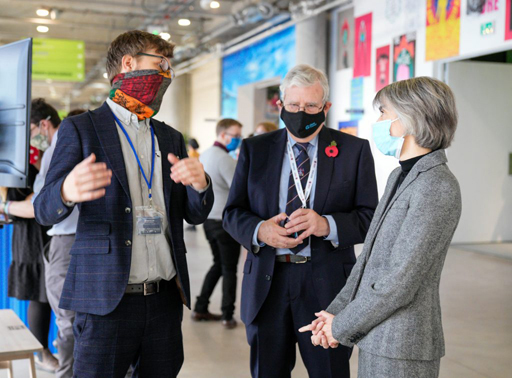Senior officials from both UK Research and Innovation (UKRI) and The Department for Business, Energy and Industrial Strategy (BEIS) visited UN Climate Change Conference of the Parties (COP26) on Science and Innovation Day.
Glass Futures’ exhibitions at COP26 demonstrated revolutionary climate action in line with the Presidency programme, which indicates that science and innovation can deliver climate solutions to meet and accelerate, increased ambition.

Professor Dame Ottoline Leyser, the Chief Executive of UKRI and Regius Professor of Botany at the University of Cambridge, said, “I was delighted to meet the Glass Futures team at COP26, an organisation at the forefront of developing and delivering new technology for the glass industry.
“Glass Futures’ collaborative approach to cutting industrial emissions is a prime example of the joined up thinking needed to build a more sustainable and inclusive economy. I was delighted to meet the Glass Futures team at COP26, an organisation at the forefront of developing and delivering new technology for the glass industry.”
Glass Futures, a not-for-profit company, is creating the Global Centre of Excellence for Glass funded through UKRIs Transforming Foundation Industry (TFI) Wave 3 Challenge. UKRI is contributing 15 million GBP to capital, fit out and commissioning costs of the Glass Futures Global Centre of Excellence in St Helens.
Glass Futures was awarded a 7.1 million GBP contract by BEIS Energy Innovation Programme to research and deliver new energy sources to the glass industry. A trial carried out earlier this year at Encirc’s (a Vidrala company) Derrylin plant in Northern Ireland proved that glass bottles can be manufactured from sustainable low carbon biofuels with an up to 90 percent carbon reduction, which was on display at COP26.
Adrian Curry, Managing Director at Encirc, said, “We’re working in partnership with industry-leading research and development organisations like Glass Futures so we can pave the way towards a net-zero glass sector. Ground breaking carbon-reduction initiatives like our biofuel trial mark a significant step forward in this journey. Glass is a hugely sustainable material and, with the use of low-carbon fuels, has a promising future as the world’s most environmentally-responsible packaging choice.”
Aston Fuller, General Manager of Glass Futures, added, “Glass is a fully recyclable and highly sustainable product and through this trial we are beginning to see the dawn of net zero technologies with glass manufacturer Encirc, with a full-scale trial of a new alternative low-carbon fuel.
“This is a precursor to the Glass Futures’ Global Centre of Excellence where smaller scale trials will take place with even more innovative approaches. These initiatives will catalyse the industry towards more sustainable, zero carbon glass production and the state-of-the-art facility will enable its members and partners to work collaboratively to research, develop and demonstrate science and innovative solutions.”






